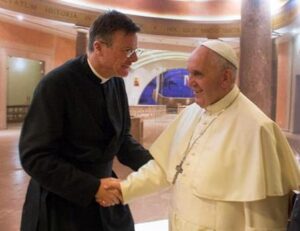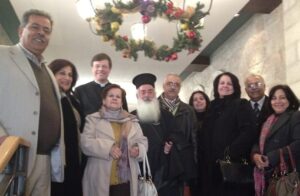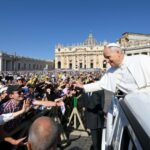The Fr. Eamon Kelly, L.C., is one of the leaders of the Pontifical Notre Dame Institute in Jerusalem. He was born in Ireland but has been working apostolically in Germany, founding the Legion of Christ there, and in other countries such as Austria and Hungary. He then spent time in the United States (in Manhattan, Kentucky, Arizona…) until he finally arrived in the Promised Land. His work is hospitality: welcoming. Since the Notre Dame Center “has a very professional staff,” he explains “I don’t need to worry much about technical aspects, but rather offer priestly care, the sacraments, encourage pilgrims on their spiritual journey through various contacts with them…”. And one of those many aspects he is involved in is interfaith relations with Christians, Jews, and Muslims. Now that we are celebrating the Week of Prayer for Christian Unity, Fr. Eamon shares his experience in this regard in the Holy Land.
Fr. Eamon, we are in the week of prayer for Christian unity. Has Notre Dame in Jerusalem organized any activities during these days?
Not particularly, since events take place in the churches of various Christian denominations, such as the Holy Sepulchre, the Latin Patriarchate, the Cenacle, and the Melkite Church.
Generally, we are always in a “week of unity” at Notre Dame and Magdala, since people from all denominations converge there, and it is quite normal on an ordinary weekday to find ourselves serving Protestants, Orthodox, Armenians, and even people of other religions.
Moreover, the people working at Notre Dame come from families of various denominations, so we constantly live together with everyone. It is very rare for us to only serve Catholics at Notre Dame and Magdala; I believe it never happens. Quite the opposite of my experience in Ireland, as a child and young man, where I only knew one non-Catholic person in my first twenty years of life. Or maybe two or three at most!
If there is a special place for ecumenism and dialogue among Christians, it is precisely Jerusalem, the cradle of Christianity. How do Legionaries of Christ and members of Regnum Christi living at Notre Dame participate in this dialogue?
As I have already explained, it is an ecumenical and even interreligious experience daily. And this is very important, because it is a continuous learning process to adapt to others and learn to coexist and testify to the great respect that must be given to each person as made in the image and likeness of God Himself.
We host various explicitly ecumenical and interreligious activities quite regularly. Recently, some Armenians stayed with us—they are the last to celebrate Christmas in Jerusalem due to their different calendar. They greatly appreciate that we keep Christmas decorations until they celebrate Christmas.
Also, a few months ago, we held several significant activities to commemorate the 50th anniversary of the Vatican II declaration Nostra Aetate.
I believe there are some regular meetings between Jews, Muslims, and Christians
We participate in various ecumenical and interreligious groups and meetings. And indeed, recently another initiative was added: a monthly prayer for peace at Jaffa Gate. There, representatives of Judaism, Islam, and Christians gather for a brief moment of spontaneous fellowship. Afterwards, in religious groups, we pray for peace.
Magdala is also a meeting point with other religions. In fact, Jews and Muslims also attended the inauguration…
At Magdala, every day is a step toward Christian unity. Yesterday, for example, a group of pastors from different Christian churches came from Germany. Later, a similar Austrian group, and afterward two Baptist schools from Minnesota and Kansas. Certainly, what Jesus said is lived out: “that they may all be one” (John 17:22-23).
On January 6th, 74 pastors from the Assemblies of God came. They asked us from their highest authority to give them a special explanation. We are very happy to open our arms to welcome everyone, and they greatly appreciate it. Hearts are opened. I often say that these ecumenical experiences at Magdala somewhat reduce the ‘inflammation of the wounds’ of the Body of Christ, and the same applies to the interreligious aspect.
Magdala, especially since the discovery of the first-century synagogue, is already a reference point and a meeting place for Jewish and Christian history. And this is relevant for all Christians. When this synagogue was used, it was frequented by disciples of Jesus without the current divisions among Methodists, Lutherans, Calvinists, Copts, etc.
What does it mean for you, as a Catholic priest, to carry out your pastoral work in Jerusalem, in the Holy Land?
I have loved being a priest everywhere I have served the Gospel, but especially here. I love it. Encountering such human diversity gives us a broad view of humanity. This means that one cannot ‘sleep’ on the job. It constantly demands and challenges us. One cannot get used to it. “Becoming all things to all” as St. Paul encouraged us, involves ongoing human and spiritual exercise in these places.
You cannot step on this land or stones without the Bible constantly speaking to you and recounting its chapters. Everywhere, there are memories of divine action and the presence of Jesus Christ.
After working so long in Central Europe and parts of the USA, I often perceive a strong cultural resistance to religion, and it may seem that the priest can appear superfluous. However, after a few days here, this barrier seems to silently melt away, hearts open, and the most fantastic conversations begin. The Holy Land is an excellent resource for addressing relativism syndromes. “If initial evangelization originated here, can we do without these lands for the New Evangelization?” our director, Fr. Juan Solana, L.C., often asks. It is also my experience.
For more information about Notre Dame in Jerusalem and the Magdala Center:
www.notredamecenter.org
www.magdala.org
Source: Lo+RC










